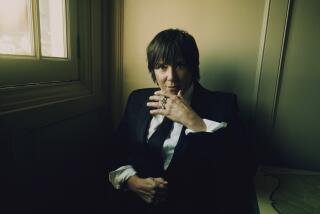For MacMaster, It’s More Than Fiddlin’ Around
- Share via
Natalie MacMaster has the look of a pop star: blond, slender, vivacious and outgoing. Her stage performances are whirling flashes of music and movement, her thick mane of hair flying as she whips her bow across her fiddle.
That’s right, fiddle. If MacMaster, a highly regarded violinist in the Celtic music world, ever surfaces in the pop pool, it’s not going to be via her singing, rapping or hip-hop dancing skills.
Singing and rapping, in particular, are out of the question.
“I have a couple of singers in my band,” she says. “But not me. I’ll tell corny jokes and that’ll be about it.”
MacMaster, who performs at UCLA’s Royce Hall on Saturday, isn’t nearly so shy about dancing, however. In her case, it is Irish step dancing--the straight-armed, limber-legged style that burst into public consciousness a few years ago with “Riverdance.”
“The step dancing--by me and some of my band--has become a part of my show over the past few years,” she says. “It’s not something that I necessarily do spontaneously; I know I’m going to do it. But some nights are extra special, and the nights when I can do a little free-form dancing, just whatever I want to do, are the most fun.”
The moments that MacMaster’s audiences insist on, however, are the brief but highly spirited segments in which she combines her dancing with her fiddle playing.
“It’s more for the sake of the show,” she explains, “because it’s really hard to dance and fiddle at the same time. But it’s not as comfortable as dancing without the fiddle, and I only put it in because I know the crowd loves it.”
Then, with a laugh, she adds, “And any time I haven’t done it I’ve heard about it.”
The Cape Breton-born MacMaster, who comes from a musical family with a Scottish lineage, is the grandniece of veteran fiddler Buddy MacMaster, one of the area’s most influential musicians. Now 29, she has been playing the instrument since she was 9, performing in her first public concert barely six months after she first picked up the fiddle. By the time she was 20, she had three recordings, all self-produced and self-released.
Cape Breton fiddle music was not exactly a style that loomed large in the view screens of most major record labels a decade ago, so it wasn’t until 1993 that Warner Music Canada risked releasing her album, “No Boundaries.” It was issued in the U.S. on Rounder Records in 1997, followed by four more over the next three years.
The resistance traced, in part, to MacMaster’s dedication to traditional Cape Breton music--unlike the more familiar Irish fiddle style, it’s a method that employs very little improvisation.
“The less improvising the better, with the Cape Breton style,” says MacMaster. “It’s considered very respectful of the music and the tradition to play the tunes the way they were written. But you can hear the same tune over and over again by 10 or 20 different fiddlers, all playing the same way, and any Cape Bretoner can pick out each of the different fiddlers from their sound. When I compare it to other styles of fiddling, I think, ‘Wow, we have a unique quality here and we should try to keep it.’ ”
“My Roots Are Showing,” her most traditional album, was nominated for a Grammy in the best traditional folk album category. Three other MacMaster albums --”In My Hands,” “Fit as a Fiddle” and “No Boundaries”--have been certified gold for the Canadian market, with each selling more than 50,000 copies.
*
MacMaster is quick to acknowledge, however, that dedicating her career to traditional music alone--despite her charismatic performing qualities--would probably not have triggered her current prominence.
“If we just did Cape Breton music our audience would be much more narrow. But I think that by giving an audience a lot of variety, it helps them to appreciate the traditional tunes.”
Toward that end, her shows are generally a mixture of elements ranging from traditional jigs and reels to occasional Latin rhythms and pop grooves. Her albums, aside from “My Roots Are Showing,” have been similarly diverse.
“Cape Breton traditional music is my favorite,” she says. But I have lots of other musical interests too. If I get excited by a certain style of music, I always want to play it. And it helps with the audience because it keeps them wondering.
“I really love it,” concludes MacMaster in true pop star fashion, “when I can get them to think, ‘Wow, I wonder what she’s going to do next!’ ”
*
* Natalie MacMaster, Saturday at Royce Hall, UCLA, 8 p.m. (CenterStage discussion, 7 p.m.). $20 to $30. (310) 825-2101.
More to Read
The biggest entertainment stories
Get our big stories about Hollywood, film, television, music, arts, culture and more right in your inbox as soon as they publish.
You may occasionally receive promotional content from the Los Angeles Times.










